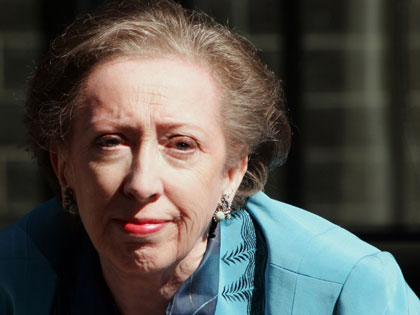|
Blair fires home secretary, reshuffles Cabinet
(AP)
Updated: 2006-05-05 20:02
LONDON -- Prime Minister Tony Blair fired his law and order chief Friday
and chose a new foreign secretary in a wide-ranging Cabinet shuffle after his
party suffered a heavy defeat in local authority elections.
Blair
initiated the shakeup after his Labour Party ran an embarrassing third in
English elections on Thursday - a result which prompted renewed calls from some
quarters for the prime minister to step down.

Britain's new Foreign Secretary Margaret
Beckett leaves number 10 Downing Street in London, England May 5, 2006,
following a Cabinet reshuffle. Prime Minister Tony Blair sacrificed two
top ministers in a major cabinet shakeup on Friday after the Labour Party
recorded one of its worst defeats in a local election since coming to
power in 1997. [Reuters] |
Home Secretary
Charles Clarke, embroiled in a politically damaging furor over the failure to
deport foreign criminals, confirmed Blair had removed him from office. Defense
Secretary John Reid replaced Clarke, and Des Browne was promoted from chief
secretary at the Treasury to secretary of defense.
Blair removed Jack
Straw as foreign secretary, replacing him with Margaret Beckett, who had headed
the Department of Environment, Food and Rural Affairs. She becomes the first
woman to hold the job. Geoff Hoon, a former defense secretary, was made junior
minister for European affairs within the Foreign Office.
Deputy Prime
Minister John Prescott, who recently admitted an affair with a secretary, will
keep his title but was stripped of the responsibilities of his department, which
include housing and planning.
The shakeup appeared aimed at
demonstrating Blair still holds a firm grip on his beleaguered government after
weeks of negative headlines and scandal.
Blair had defended Clarke over
the prisoner controversy, but said Friday: "I felt that it was very difficult,
given the level of genuine public concern, for Charles to continue."
Clarke said he had turned down offers of other posts.
In low
turnout, Britain's Conservatives won 40 percent of the vote, compared to just 26
percent for Labour.
Conservative leader David Cameron, touring a
district in west London which the Tories captured for the first time since the
1960s, said the Cabinet changes would prove insufficient.
"It'll take
far more than a reshuffle," Cameron said. "What we need in this country is a
replacement of the government."
"I think what we have seen over the last
few hours is that while the Labour Party is collapsing, the Conservative Party
is building," Cameron said, adding: "I'm a happy man this morning."
Voters in Thursday's elections chose representatives to fill 4,360 seats
in 176 local authorities across England, a little less than half of all English
councils. London was the biggest battleground, with elections in all 32
boroughs.
Labour's poor showing was likely to embolden those calling for
Blair to step down soon or at least offer a timeline as to when he may leave
office.
Most Labour members of Parliament "are saying now that we've got
to get the party under new management. It ought to happen fairly soon," said
Frank Dobson, who was health secretary in Blair's first Cabinet.
Glenda
Jackson, a former Labour government minister who has been a persistent critic of
Blair, joined the calls for him to step down. "The problem for the party and its
government is its leader," she said.
Labour took 1,065 seats, down 251
seats compared with the results of the last election, while the Conservatives
won 1,567 seats, a gain of 249. Vote counting was not yet completed.
Labour lost control of 16 local councils - including some boroughs
in London - and the Tories gained eight. The far-right British National Party
won 13 seats.
A similarly poor local election result for Labour in 2004
didn't stop Blair from leading the party to its third straight national election
victory a year later - albeit with a reduced majority in the House of Commons.
Treasury chief Gordon Brown, widely expected to succeed Blair, said
voters were concerned about issues of crime, terrorism and their financial and
job security.
"We've got to show in the next few days, not just in the
next few weeks, that we are sorting these problems out," he told British
Broadcasting Corp. radio.
|
| |
|
| |
|